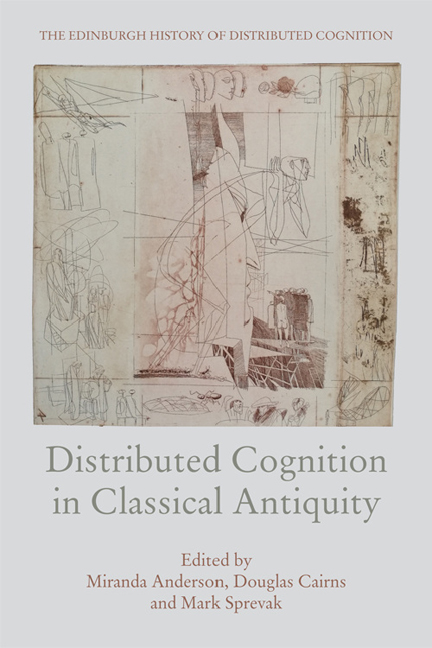Book contents
- Frontmatter
- Contents
- List of Illustrations
- Series Preface
- Miscellaneous Frontmatter
- 1 Distributed Cognition and the Humanities
- 2 Distributed Cognition and the Classics
- 3 Physical Sciences: Ptolemy's Extended Mind
- 4 Distributed Cognition and the Diffusion of Information Technologies in the Roman World
- 5 Mask as Mind Tool: A Methodology of Material Engagement
- 6 Embodied, Extended and Distributed Cognition in Roman Technical Practice
- 7 Roman-period Theatres as Distributed Cognitive Micro-ecologies
- 8 Cognition, Emotions and the Feeling Body in the Hippocratic Corpus
- 9 Enactivism and Embodied Cognition in Stoicism and Plato's Timaeus
- 10 Enargeia, Enactivism and the Ancient Readerly Imagination
- 11 Group Minds in Classical Athens? Chorus and Dēmos as Case Studies of Collective Cognition
- 12 One Soul in Two Bodies: Distributed Cognition and Ancient Greek Friendship
- 13 Distributed Cognition and its Discontents: A Dialogue across History and Artistic Genre
- Notes on Contributors
- Bibliography
- Index
13 - Distributed Cognition and its Discontents: A Dialogue across History and Artistic Genre
Published online by Cambridge University Press: 12 November 2019
- Frontmatter
- Contents
- List of Illustrations
- Series Preface
- Miscellaneous Frontmatter
- 1 Distributed Cognition and the Humanities
- 2 Distributed Cognition and the Classics
- 3 Physical Sciences: Ptolemy's Extended Mind
- 4 Distributed Cognition and the Diffusion of Information Technologies in the Roman World
- 5 Mask as Mind Tool: A Methodology of Material Engagement
- 6 Embodied, Extended and Distributed Cognition in Roman Technical Practice
- 7 Roman-period Theatres as Distributed Cognitive Micro-ecologies
- 8 Cognition, Emotions and the Feeling Body in the Hippocratic Corpus
- 9 Enactivism and Embodied Cognition in Stoicism and Plato's Timaeus
- 10 Enargeia, Enactivism and the Ancient Readerly Imagination
- 11 Group Minds in Classical Athens? Chorus and Dēmos as Case Studies of Collective Cognition
- 12 One Soul in Two Bodies: Distributed Cognition and Ancient Greek Friendship
- 13 Distributed Cognition and its Discontents: A Dialogue across History and Artistic Genre
- Notes on Contributors
- Bibliography
- Index
Summary
Writing a history of distributed cognition requires equal attention to cognition and history. Theories of cognition are diverse and contested, in antiquity as today; so are theories and practices of history. Loosely speaking, we might differentiate between history as teleological narrative of actions and events from past to present, and history as retrospective identification and analysis of salient aspects of earlier human experience. If we adopt the latter approach, we are not out of step with our respective disciplines of Classics and Art History, which have incorporated the study of ideological and other frameworks that condition prior instances of engagement with an earlier past. However, this general disciplinary project has come to something of an impasse, leading either to discontinuous accounts of discrete instances of ‘reception’ or to the implicit adoption of past intellectual models, recapitulating the nineteenth-century ‘isms’, such as formalism, historicism and empiricism, that have long structured our respective disciplines. One way out of this impasse is to embrace a new type of intellectual history that analyses the encoding of knowledge that simultaneously produced the objects of our study and the analytical tools used to study those objects. It is our contention that a history of distributed cognition can contribute to this form of intellectual history by asking what key versions of cognition and knowledge production become apparent to the later observer who seeks them out, and why they take the shape they do.
There are at least three methodological benefits for the historian in treating cognition as distributed, that is, not limited to discrete agents, artefacts or temporalities. First, and most important, with cognitive or intellectual agency understood as distributed, intellectual history is freed from the expectation to privilege a single analytical framework as the lens through which materials must be studied. Neither the analytical framework of the period being studied, nor the nineteenth-century frameworks that founded the discipline, nor contemporary models of thought need take priority in the analysis of cultural objects. Secondly, and following this first point, a broadly diachronic analysis that incorporates the study of different types of materials from different historical moments becomes possible: diverse ‘sources’, in all their historical specificity, can be treated as multiple and interconnected approaches to a single cognitive problem rather than one-off moments of reception.
- Type
- Chapter
- Information
- Distributed Cognition in Classical Antiquity , pp. 229 - 243Publisher: Edinburgh University PressPrint publication year: 2017



